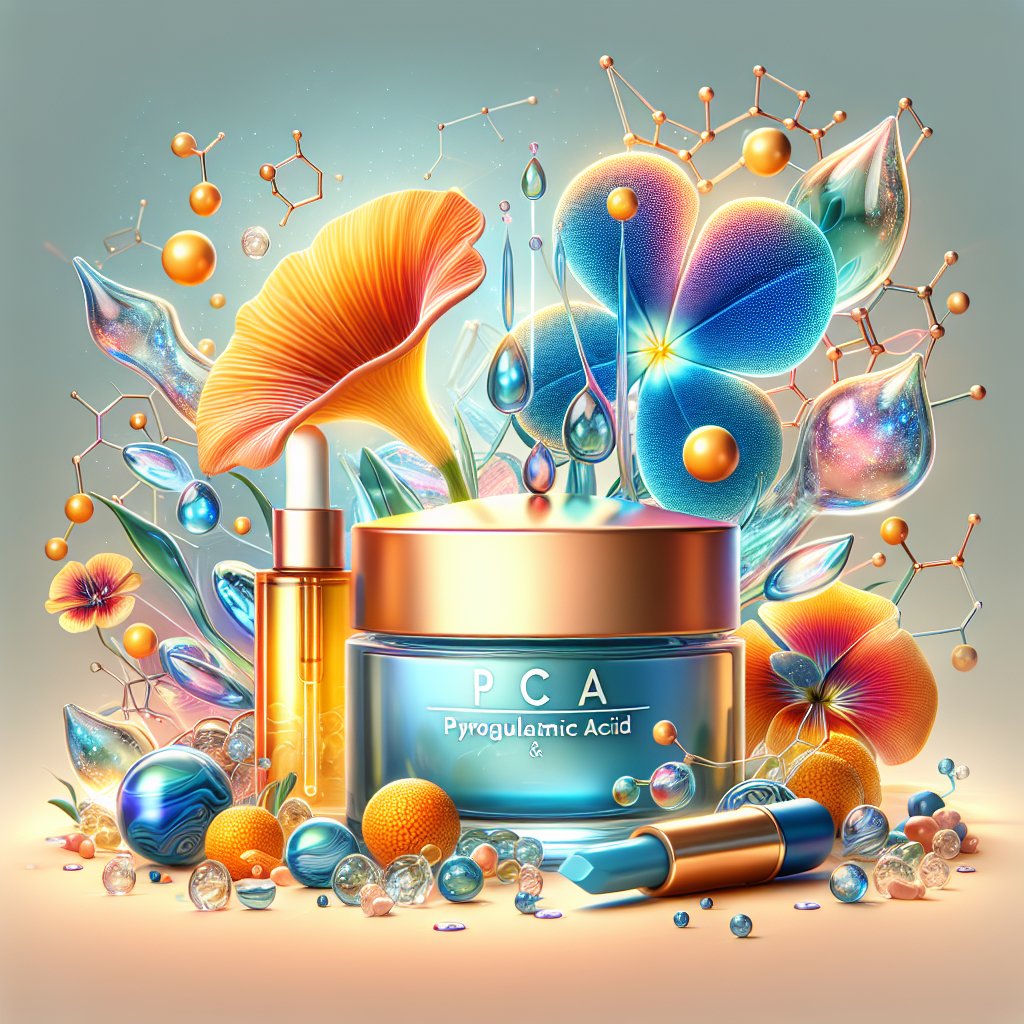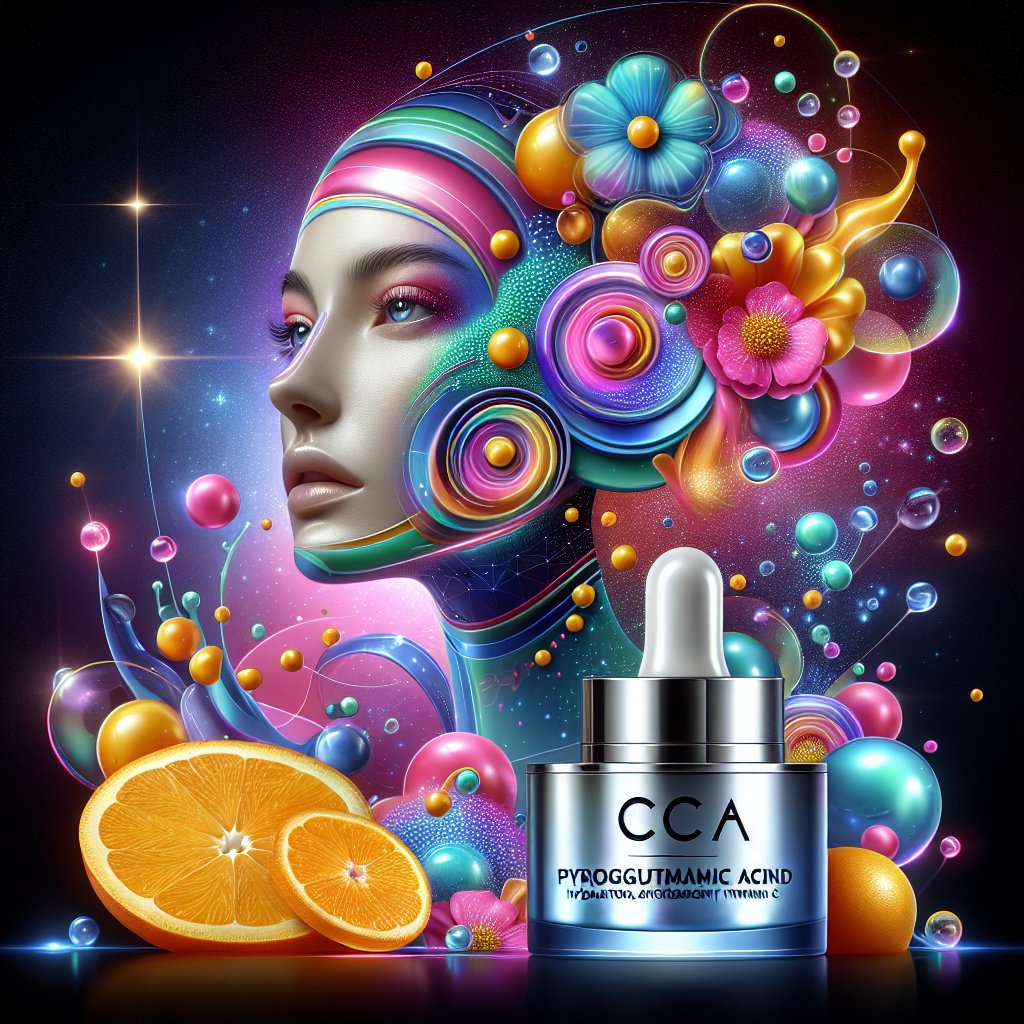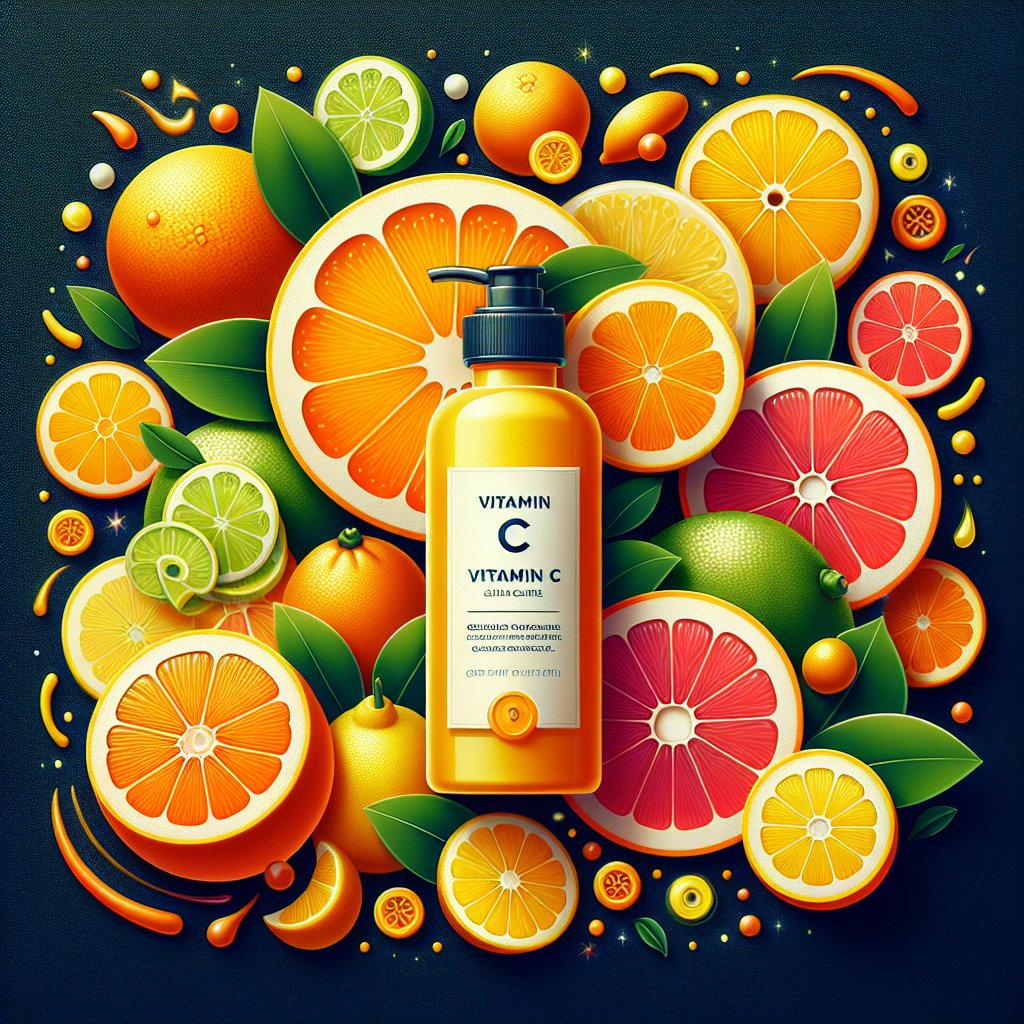Unlock the Secrets of PCA and Vitamin C: Your Ultimate Guide to Radiant Skin!
Unlock the Secrets of PCA and Vitamin C: Your Ultimate Guide to Radiant Skin!
Brief Explanation of PCA (Pyroglutamic Acid) and its Benefits for the Skin
Hey there, skincare enthusiasts! If you’re on a quest for a radiant and healthy complexion, you might have come across the buzz around PCA (Pyroglutamic Acid) and its remarkable benefits for the skin. So, what’s the deal with PCA, and how can it transform your skincare game?
Well, PCA, an abbreviation for pyrrolidone carboxylic acid, is a naturally occurring component in the skin’s natural moisturizing factor (NMF). This specific form of glutamic acid plays a crucial role in maintaining the skin’s hydration levels and promoting a supple, plump appearance. But that’s not all – PCA brings a lot more to the table!
The Skin Benefits of PCA
Research has shown that PCA is a powerhouse ingredient when it comes to skincare, mainly due to its hydrating properties. It supports the skin’s natural moisture barrier, helping to keep it soft, smooth, and well-nourished. Additionally, PCA also acts as an antioxidant, aiding in the protection of the skin from environmental stressors, such as pollution and UV rays.
In skincare products, PCA is revered for its ability to replenish and lock in moisture, making it a must-have ingredient for anyone dealing with dry, dehydrated, or sensitive skin. Its humectant properties make it an excellent choice for all skin types, as it draws and retains moisture from the surroundings, keeping the skin adequately hydrated without feeling greasy or heavy.
So, if you’re on the lookout for a skincare ingredient that can provide superb hydration and antioxidant protection, PCA might just be your new skincare hero!
In the next sections, we’ll dive deeper into how PCA works in synergy with Vitamin C and uncover the secrets behind their combined benefits for achieving that coveted radiant skin. So, stay tuned as we unlock the ultimate guide to harnessing the power of PCA and Vitamin C for your skincare routine!

Detailed Overview of the Benefits of Vitamin C for Skin Health
When it comes to achieving radiant and healthy skin, few ingredients are as powerful as Vitamin C. This essential nutrient offers a myriad of benefits that can transform the health and appearance of your skin.
Antioxidant Properties
Vitamin C is celebrated for its potent antioxidant properties, which help to protect the skin from the damaging effects of free radicals. Free radicals are unstable molecules that can cause premature aging and damage to the skin. By neutralizing these free radicals, Vitamin C helps to maintain the skin’s youthful appearance and overall health.
Brightening Effect
One of the most coveted benefits of Vitamin C is its ability to brighten the skin. As an antioxidant, Vitamin C helps to lighten hyperpigmentation and dark spots, resulting in a more even and radiant complexion.
Promotion of Collagen Production
Vitamin C plays a crucial role in the synthesis of collagen, a protein that is essential for maintaining the skin’s firmness and elasticity. By promoting collagen production, Vitamin C helps to improve the skin’s texture and reduce the appearance of fine lines and wrinkles.
Combatting Hyperpigmentation
Hyperpigmentation, such as age spots and sunspots, can be effectively addressed with Vitamin C. Its ability to inhibit the production of excess melanin helps to fade existing pigmentation and prevent the formation of new discoloration.
With its antioxidant prowess, brightening effects, collagen-boosting properties, and ability to combat hyperpigmentation, Vitamin C is truly a powerhouse ingredient for achieving radiant and healthy skin.
Role of PCA and Vitamin C in Skincare Products
Let’s dive into the fascinating world of skincare ingredients and unveil the powerful synergy between PCA and Vitamin C. These two components are like the dynamic duo, working together to provide remarkable benefits for your skin.
The Power of PCA
First up, let’s talk about PCA – short for Pyrrolidone Carboxylic Acid. This incredible ingredient is a natural component of the skin’s own NMF (Natural Moisturizing Factor). Its primary role is to help maintain the skin’s hydration levels, keeping it plump and supple. Additionally, PCA has humectant properties, meaning it attracts and retains moisture, resulting in a smoother and more hydrated complexion.
Vitamin C’s Radiant Benefits
Now, let’s shine the spotlight on Vitamin C, a beloved skincare staple known for its brightening and antioxidative properties. Vitamin C is a potent antioxidant that helps combat free radicals and environmental stressors, thus reducing signs of aging and promoting a more even skin tone.
Synergistic Effects and Enhanced Efficacy
When these two powerhouses, PCA and Vitamin C, join forces in skincare products, the results are truly remarkable. PCA acts as a hydrating agent, enabling Vitamin C to penetrate the skin more effectively. This allows Vitamin C to unleash its antioxidative prowess, working to even out the skin tone and boost radiance.
In essence, the combination of PCA and Vitamin C maximizes the hydrating and protective benefits of both ingredients, resulting in a more radiant, youthful-looking complexion.
By incorporating products containing both PCA and Vitamin C into your skincare routine, you can ensure that your skin receives optimal hydration and protection, while also enjoying the brightening and anti-aging benefits.

Choosing the Right Skincare Products with PCA and Vitamin C
When it comes to selecting skincare products that contain both PCA and Vitamin C, it’s essential to pay attention to a few key factors. These two powerhouse ingredients offer a myriad of benefits for your skin, from hydration to brightening and protection against environmental damage. Here are some tips to help you navigate through the sea of options and find the perfect products that deliver optimal results for your skin.
Understanding Product Labels
When shopping for skincare products, it’s crucial to read and understand the product labels. Look for terms such as “PCA” and “Vitamin C” prominently displayed on the packaging. Keep an eye out for specific forms of Vitamin C, such as ascorbic acid, as this is the most effective form for skincare benefits. Additionally, check for the concentration of these ingredients, ensuring they are present in effective amounts for noticeable results.
Checking Ingredient Lists
Take the time to scrutinize the ingredient lists of the products you’re considering. Ensure that PCA and Vitamin C are listed as active ingredients, ideally towards the beginning of the list. This signifies higher concentrations of these beneficial components. Look out for any potential allergens or irritants that could counteract the benefits of PCA and Vitamin C for your skin.
Finding High-Quality Products
Seek out reputable skincare brands that prioritize the quality and efficacy of their products. Look for third-party certifications, such as cruelty-free or organic labels, which can indicate a higher standard of formulation. Additionally, reading reviews and seeking recommendations from skincare professionals or trusted sources can aid in finding high-quality products that harness the power of PCA and Vitamin C to promote radiant, healthy skin.
By following these tips and being mindful of the ingredient labels, you can confidently select skincare products that contain PCA and Vitamin C, ensuring that you provide your skin with the best care and nourishment it deserves.
Practical Tips for Incorporating PCA and Vitamin C into Your Skincare Routine
So, you’ve heard about the magic of PCA and Vitamin C for your skin, and now you’re eager to incorporate these powerful ingredients into your daily skincare routine. Well, you’re in the right place! I’ve got some practical tips to help you make the most of PCA and Vitamin C for radiant, glowing skin.
Usage Frequency
When it comes to PCA and Vitamin C, consistency is key. Research suggests that applying PCA twice daily can significantly improve skin hydration and elasticity. As for Vitamin C, studies have shown that using it once a day, preferably in the morning, can help protect the skin from environmental stressors like pollution and UV rays.
Application Techniques
When applying PCA, start with a clean face, then apply a small amount and gently massage it into the skin. As for Vitamin C, a pea-sized amount is usually sufficient for the entire face. Be sure to apply it evenly and allow it to fully absorb before proceeding with the rest of your skincare routine.
Potential Combinations with Other Skincare Ingredients
Combining PCA and Vitamin C with other complementary ingredients can enhance their effectiveness. For example, Vitamin C can be paired with Vitamin E to boost its photoprotective properties. Additionally, using PCA alongside hyaluronic acid can maximize its hydrating effects, leaving your skin plump and supple.
By following these practical tips, you can seamlessly incorporate PCA and Vitamin C into your daily skincare routine, ensuring maximum effectiveness for a radiant and healthy complexion.

Potential Side Effects and Precautions
Before diving into the world of PCA and Vitamin C for your skincare routine, it’s essential to be aware of the potential side effects, especially for individuals with specific skin types, sensitivities, and allergies. While PCA and Vitamin C are generally safe for most people, some may experience adverse reactions.
For those with sensitive skin, it’s crucial to proceed with caution when introducing PCA and Vitamin C products. Potential side effects may include redness, itching, and irritation. Individuals with allergies to certain ingredients commonly found in skincare products, such as citrus extracts for Vitamin C or certain preservatives for PCA, may experience allergic reactions.
It’s always a good practice to perform a patch test before using any new skincare product, especially those containing potent ingredients like PCA and Vitamin C. Apply a small amount of the product to a discreet area of your skin, such as behind your ear or on the inner forearm, and observe for any adverse reactions over 24 hours. If you experience any redness, swelling, or discomfort, discontinue use immediately.
Consulting a dermatologist is advisable, particularly for those with pre-existing skin conditions or concerns. A dermatologist can provide personalized recommendations based on your skin type and medical history. They can also conduct allergy testing to determine if you have any specific sensitivities to ingredients commonly found in PCA and Vitamin C products.
By taking these precautions and seeking professional guidance when necessary, you can enjoy the benefits of PCA and Vitamin C while minimizing the risk of adverse reactions.
Recap of the Key Points: PCA and Vitamin C in Skincare
Throughout this guide, we’ve delved into the incredible benefits of PCA and Vitamin C in skincare. It’s essential to recap and emphasize the significance of incorporating these powerhouse ingredients into your daily skincare regimen.
PCA: Hydration and Nourishment
PCA, or pyrrolidone carboxylic acid, is a natural moisturizing factor in the skin. It’s a key component in maintaining skin hydration, preventing water loss, and supporting a healthy skin barrier. Research has shown that PCA can effectively improve skin hydration, making it a crucial ingredient for a radiant and supple complexion.
Vitamin C: Brightening and Protection
Vitamin C is a potent antioxidant that helps in skin brightening and protecting against environmental stressors. Scientific studies have demonstrated its ability to reduce the appearance of dark spots, improve skin texture, and boost collagen production. Incorporating Vitamin C into your skincare routine can lead to a more even-toned, glowing complexion.
Importance of Incorporating PCA and Vitamin C
When combined, PCA and Vitamin C complement each other, creating a well-rounded skincare regimen. PCA provides essential hydration and nourishment, while Vitamin C offers brightening and protective properties. Together, they work synergistically to promote healthy, radiant skin.
Incorporating PCA and Vitamin C into your daily skincare routine can help address multiple skin concerns, including hydration, brightness, and protection against environmental aggressors. These ingredients are crucial for supporting overall skin health and achieving a luminous complexion.


